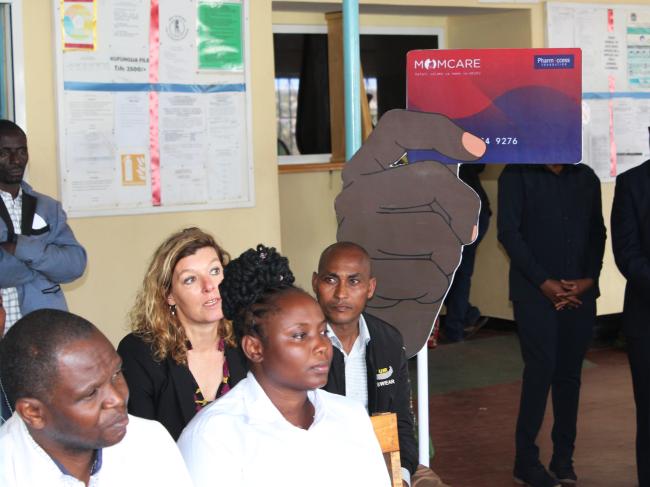In Tanzania, expectant mothers are supposed to receive free, basic prenatal care through government programs. However, there are many gaps in the system, including supply-chain challenges, limited financing, and a lack of transparency and accountability. As a result, many women find that they must pay out of pocket for much of their care during pregnancy, and that many vital services such as ultrasound scans are not included.
To close this gap and ensure that pregnant women can receive the care they need to keep themselves and their babies healthy, PharmAccess has launched MomCare, an innovative demand-side model for financing maternal care that uses digital technology to enable payments and collect data. Hospitals and clinics are reimbursed for the services that they deliver to patients.
The program, which has reached more than 26,000 women in Tanzania, is aimed at helping women pay—with funds deposited by the MomCare project—for prenatal care while tracking their medical histories so that providers can monitor quality of care and usage of services. During their first visit to the clinic, pregnant women can register (no ID required) and receive a card provided by the mobile payments aggregator company Selcom, which they can use at all visits. They can also enroll themselves and up to five dependents in Improved Community Health Fund (iCHF), an insurance program designed and piloted by PharmAccess before the model was adopted by the government and rolled out in all the regions of the country.
Clinic staff use a digital MomCare app to collect medical data from patients and track service usage. The program reimburses the clinic for services rendered at the end of each month.
Data gathered by MomCare since its launch in 2019 shows significant improvements in several areas. Baseline data from the first year of the program revealed that only 17% of women attended the required four prenatal visits; by year 3, this proportion had increased to 58%. Skilled deliveries increased from 47% to 69% in participating facilities during that time. In addition, MomCare facilities have seen their average SafeCare quality score rise from 41% to 57%.

During her October 2022 visit to Tanzania, the Special Advocate met with several women who are participating in MomCare at Charlotte Health Centre in West Kilimanjaro.
Narasa Maimu, a single mother with four children, works primarily as a day laborer on farms. All her children were born at different facilities; her last was born at Charlotte Hospital in April 2021, where she was enrolled in the MomCare program.
The UNSGSA also met Lilian Kahakwa, a mother of four who occasionally works in farming but is primarily a homemaker. During her last pregnancy, she was enrolled in MomCare at Charlotte Hospital, where her youngest child was born in September 2021.
In addition, the UNSGSA heard from Victoria Mollel, a food vendor and mother of three who delivered her youngest child at Charlotte Hospital and received care through MomCare.
Along with improving health outcomes for these women and their babies, MomCare is poised to drive lifesaving changes to Tanzania’s health financing model. Using the data gathered through the program, advocates are making the case to the Ministry of Health for switching from a supply-side model to a demand-side system that empowers women to seek the care they and their growing families need.